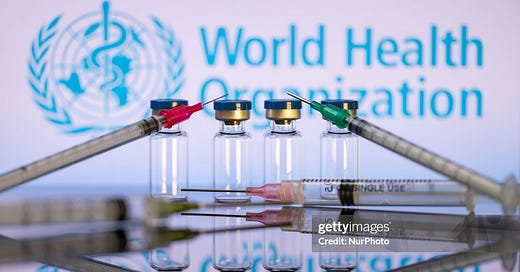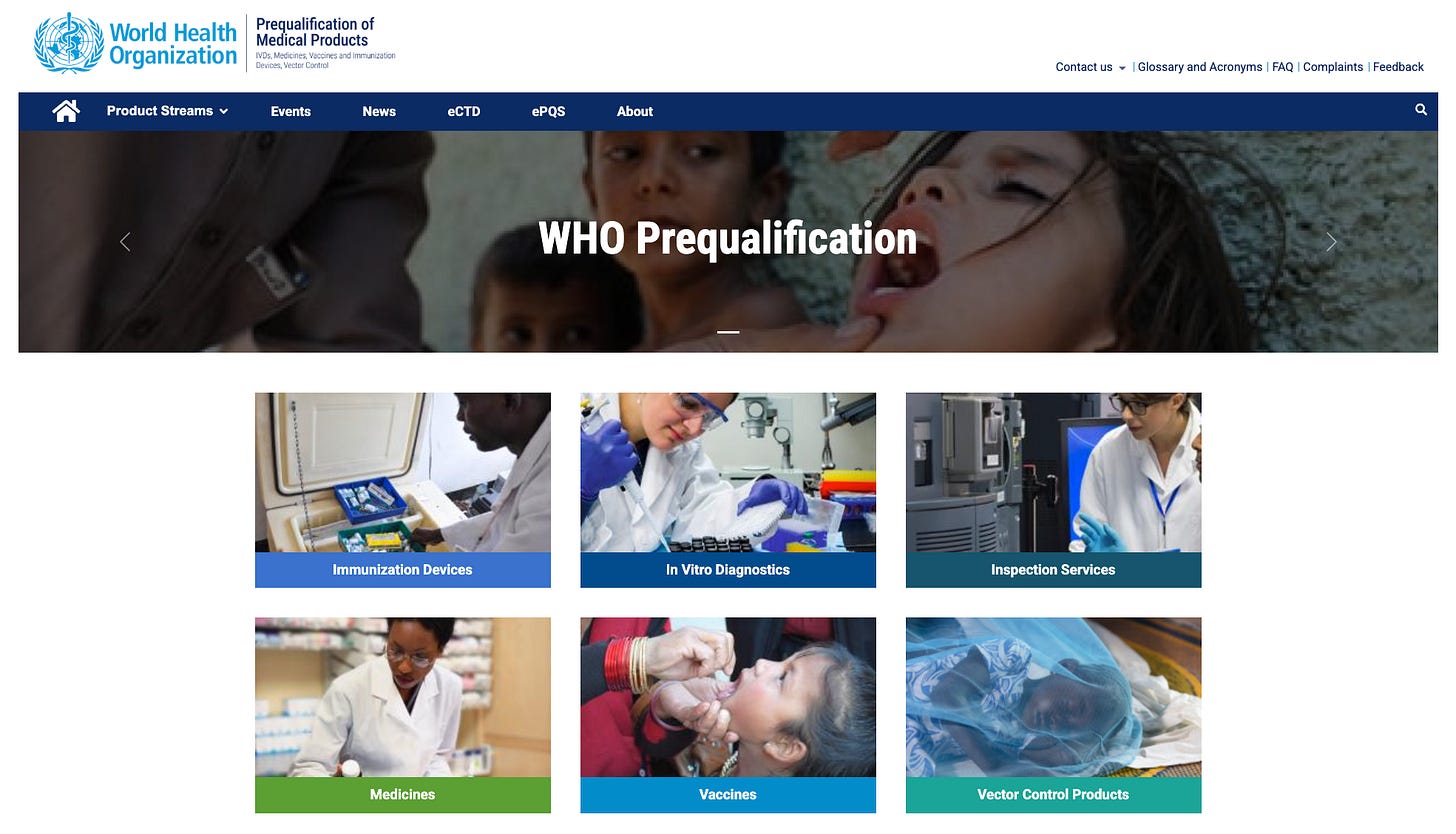WHO's Regulating The World's Vaccines?
Did you know that the WHO has become a global regulatory body, allowing medicine, vaccines, medical devices and diagnostics to enter worldwide markets through UNICEF and Gavi?
The 77-year old World Health Organization plays a leading role in advising its 194 member states on matters relating to public health, medical science and vaccines.
The WHO is also responsible for setting standards and establishing guidelines to be followed by nations and private partners, notably biological standardization, which is essential for the pharmaceutical industry.
The WHO Prequalification (PQ) program was first established for vaccines in 1987, primarily to support UNICEF in ensuring the quality, safety, and efficacy of vaccines supplied through UN procurement agencies in low to middle-income countries.
The first vaccines that received WHO-PQ status were Stamaril® (against yellow fever) and genetically engineered Engerix® (against hepatitis B).
From 1987 to 1999, costs for the WHO-PQ program were largely covered by UNICEF funds. The WHO-PQ financing framework would be significantly updated from 1999.
In 1993, Serum Institute of India became the first vaccine manufacturer in a developing country to achieve WHO-PQ status for its measles vaccine.
The WHO-PQ program expanded to medicines in 2001, and diagnostics in 2010, with vector control products (against mosquitos, sandflies, ticks) added in 2017. An example of the latter are insecticide-treated nets (ITNs)—used to prevent malaria.
Below are some examples of prequalified products available in January 2019.
By 2025, over 270 vaccines have been prequalified by the WHO.
Download this excel sheet to see the full list of prequalified vaccines, searchable by year, disease and manufacturer.
In 1996, a significant revision and development of the WHO-PQ program took place, introducing major changes such as increased emphasis on Good Manufacturing Practices (GMP), the requirement for a defined summary file or dossier, and a greater role for the national regulatory authority of the manufacturing country.
In 1999, the WHO established prequalification fees for vaccines, followed by diagnostics in 2008, and medicines in 2013.
In 2016, WHO-PQ vaccine assessments cost up to US$67,000 plus annual maintenance of US$16,800. By this year, the annual budget to operate the WHO-PQ program was estimated to be around US$30–40 million, financed by Unitaid, the Bill & Melinda Gates Foundation and manufacturer fees.
By 2023, the price of each WHO-PQ vaccine assessment soared to US$237,000 and to US$250,000 for annual maintenance.
In July 2023, Rethink Priorities, a think-tank based in San Francisco, produced an insightful yet “shallow investigation” on the WHO Prequalification program, commissioned by Open Philanthropy.
“Rethink Priorities is a research and implementation organization focused on identifying and acting on pressing opportunities to improve global well-being.”
Has the WHO overstepped its mandate to become a global governing body on medicines, vaccines, medical devices, diagnostics and vector control products?
The WHO plays a central role in the pharmaceutical trade and has integrated itself into the business of commerce, potentially placing profits and financial interests before public health. Expensive products can be pushed and promoted over cheaper alternatives and natural non-patentable remedies.
With regulatory capture being a very valid and alarming issue, external experts and consultants relied upon for product assessments may be at the service of industry. Despite having to declare their conflicts of interest, the revolving door dynamics between industry, academia, regulatory bodies and government authorities poses a genuine threat to public health.
There is a legitimate risk that industry interests shape regulatory standards, especially when corporate representatives—presented as “experts”—participate in working groups or when industry-funded user fees support regulatory activities—as is the case with the WHO-PQ, EMA, FDA, TGA, MHRA and Swissmedic.
Are the interests of the public truly being served to improve the health of populations worldwide?
Or is the WHO participating in a political power grab to generate great profits and guarantee markets for pharmaceutical manufacturers intent on selling us more products for more problems?
The WHO has a crucial function in the availability and procurement or medical products, especially in times of crisis. Together with its influence on information and public health policy, the WHO has managed to create a centralized control network spanning out all over the world—in government, NGOs, academia, institutions, foundations and private industry.
With the expanded enterprise of pandemic prevention, preparedness and response through the recently approved (but not yet ratified) Pandemic Treaty and the questionable updates to the International Health Regulations, the WHO’s position—coupled with its lack of accountability and transparency—has become even more problematic.
Further reading…
“Although the goal of the WHO is not to supplant national drug regulatory authorities, its Prequalification of Medicines Programme (Prequalification Program) has become the de facto drug approval authority for essential medicine manufacturers operating in many low- and middle-income countries (LMICs).”
Connor Fuchs, Process Is Due: The World Health Organization Prequalification of Medicines, 68 Emory L. J. 641 (2019). Available at: https://scholarlycommons.law.emory.edu/elj/vol68/iss3/5
Twenty-five years of the WHO vaccines prequalification programme (1987–2012): Lessons learned and future perspectives
“WHO prequalification aims to ensure that selected diagnostics, medicines, vaccines, immunization-related equipment and devices for high burden diseases meet global standards of quality, safety and efficacy, in order to optimize use of health resources and improve health outcomes. It consists of a transparent and scientifically sound assessment process that in conjunction with other procurement criteria is used by United Nations (UN) and other procurement agencies to make purchasing decisions regarding specific commodities (diagnostics, medicines and/or vaccines).”
https://pmc.ncbi.nlm.nih.gov/articles/PMC5355375/
The World Health Organization Prequalification Program and Clinical Pharmacology in 2030
”Access to affordable, high‐quality medicines, vaccines, and medical devices is critical to patients in resource‐limited settings. For the past 23 years, the World Health Organization Prequalification Program (WHOPQ) has provided procurers with a rigorous assessment of the quality of these products. As the number of important products has soared, the resources of the WHOPQ program are being strained. Advances in the field of clinical pharmacology could help meet the increased demand on this important program.”
https://pmc.ncbi.nlm.nih.gov/articles/PMC7586841/











